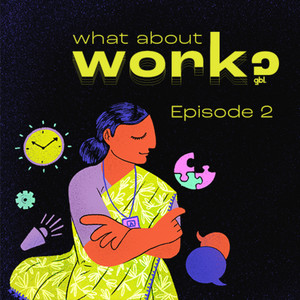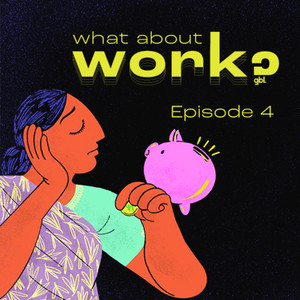The third episode of What About Work? discusses how soft skills can benefit female workers, specifically in combating sticky floor syndrome in factories. Conversations with female workers, supervisors, and researchers provide examples and illustrate how soft skills have aided their personal and professional development, thereby improving confidence. Time management, problem-solving, and communication skills helped the supervisor to function more effectively on the factory floor. It is additionally beneficial to the workers that work with those supervisors. As a result, we understand how soft skills training for factory workers creates a domino effect.
Transcript
Sowmya D: Men hold the positions which have more decision-making power, which have more authority even though this is a garment industry and it employs a majority of women workers.
Remember Sowmya Dhanaraj? She joined us in the first episode of What About Work? She’s back today for the discussion that began in episode two: soft skills. Soft skills impact production. They impact productivity. They affect the physical and mental health of workers in labor-intensive industries.
But can they be useful in breaking the sticky floor syndrome Sowmya described? Can they support more women climbing that ladder? Let’s find out.
*Intro music*
Hello! And welcome to What about work? An audio series produced by Good Business Lab.
Good Business Lab seeks to globally transform the lives of low-income workers through rigorous research and evidence-based solutions.
What about work? talks about the past and current experiences of workers in labor-intensive industries and other emerging sectors from different geographies. Be it garment, automobile, fast food, platform gig work or any other.
Today we are focusing on the experiences of women in India’s giant garment sector.
Sowmya D: It is much easier for firms to employ women because they demand less in terms of wages and it is also easier to hire and fire them. The most important factor is actually poverty or poor economic standard of living that pushes these women to take up jobs in India’s garment industry. Women’s employment in this sector actually helps to ease the financial constraints of these families.
So when a large percentage of garment workers are women hoping to improve their own lives and the lives of their families, why is it that their supervisors are mostly men?
Reena P: When I started supervisory training in my units there were almost 18 male members and only 2 female supervisors who were there. so there was some insecurity.
Sowmya D: We have a strong prescription or a strong division of, you know, what are acceptable jobs for women and for men, both inside and outside the domestic spheres.
Women are not thought of as good leaders or managers. Everyone’s heard the line “women are too emotional”. But there’s a particular emotion that in industries like the ready-made garment one, people believe is something supervisors needed and women lacked. Anger. In the last episode, we heard from Achyuta Adhvaryu. He was talking about how yelling at workers was considered not just normal but actually part of a supervisor’s job. It’s how you get the work done.
Usha: I am from Tamilnadu.I got married in the year 1994 And that was around the time that I came here to Bangalore. I started working in 2000.
Usha is a supervisor in a garment factory. After years of working, she became one of the very few women supervisors in the factory. She started out as a helper which means she was responsible for supporting the production process of cutting, sewing, and stitching the cloth. This could include anything from cleaning the machines, bringing supplies, and several other tasks. As she worked her way up to machine operator, she too had a supervisor. But supervisors are simply one part of the supply chain. There are those higher up whose behavior they replicate. And what you see your supervisor do is then what you think of the position as. And so, the cycle continues.
Usha: We were used to shouting in communications.
Soft skills can do a lot to change this entrenched belief.
Mansi Kabra, Associate Director of Marketing and Transformation, was witness to STITCH trainings in its initial days. She says:
Mansi K: in one session, I particularly noticed, the workshops lend a third-person perspective to the participants. So when you stand on the bylines and see your peers, one in the role of a worker and the other their supervisor, you’re beckoned to think and feel from both their perspectives, which helps you understand and gain clarity on how they can work together as a team than just as individuals.
Smit Gade explains the impact this can have.
Smit G: A lot of women face distress because of the job because the job itself is hard job. So when you have a manager empathetic, that might have an immense impact on the workers, right? So I do think that it’s essentially a core element of how you can change a workplace and making it better for every stakeholder involved, especially workers. Because a lot of what experience from the firm they have is mediated through their supervisor or their front-line managers. That’s what they see as a firm, right? That’s why I think it’s immensely beneficial for managers themselves who become better managers but also for the workers who are managed by them.
For workers, the higher-ups are the firm. Their experience of the firm is directly related to their relationship with supervisors. Positive, healthy communication then becomes key to retaining the workforce.
Worker 3 (Supervisor): I have become more cognizant of the working environment, training has helped me to understand that communication with the workers doesn’t have to necessarily involve speaking in a higher pitch, particularly to get the work done.
Worker 4 (Operator): My Supervisor is very supportive and listens to all my problems. According to me, she doesn’t react in the wrong way or speak impolitely with anyone in my line unreasonably. If a problem arises, she tries her best to provide a solution. For eg: I wanted to take a 10-day leave and I have taken many leaves before this. She tried her best to make sure my leaves are approved by the manager as she understands my issue, that I am a woman and I have many responsibilities. Another worker in my line was asked to resign by the HR manager but our supervisor protected and supported her.
So soft skills can transform the relationships between workers and supervisors. But can they bolster women’s personal and professional growth?
Madhukari M: An experimental study in Togo with micro enterprise owners wherein the treatment arm received a personal initiative training and another arm that received a traditional business training.
In the study Madhukari Mishra mentions, the personal initiative training prioritized not only hard skills like inventory etc, but also soft skills like goal-oriented planning, creative problem-solving, proactively exploring opportunities and others. Women in the traditional business group saw their profits rise by a mere 5%. But for women who were in the psychology-based personal initiative training group, this number jumped to a whopping 40%.
Emir: The main way enriching the soft skill set of managers can directly have monetary benefits for the workers is through incentive payments where the firm pays bonuses to employees on the basis of performance. Our data shows that the average line with untrained supervisors will produce about 56 garments in a given day. However, lines with stitch-trained supervisors produce again on average 60 garments during the training period and 59 garments in the six months following the training. Given the training is not short, it lasts around 9 months, this is a substantial effect. Workers on these lines can have monetary benefits through higher incentive payments. the amount of payments to lines with stitch train managers are also increased by about 35% after STITCH training. This corresponds to about an additional ₹75 in the average daily incentive.
That’s what soft skills can do.
Mansi K: I think it encouraged women workers to also dream of becoming a supervisor one day because they realize they don’t have to resort to, you know, shouting.
But it’s important that any training seeking to impart developmental skills be shaped in consultation with the workers receiving them.
Mansi K: I think STITCH is a very strong soft skills training curriculum that the industry didn’t have in place before. It has definitely evolved a lot from the feedback of supervisors and workers who have undergone these training sessions, which has been, which has happened in a very live manner which has been, you know, refreshing to see.
Bopanna Changappa, Field Manager at Good Business Lab, has been involved with STITCH since 2017. Here he is speaking about how he used good old Whatsapp to spark a friendship between supervisors in Bangalore.
Bopanna C: I have started the WhatsApp group.
Nihira R: Oh, that’s, that’s interesting. So you started a Whatsapp group with all the people taking the training, the workers, and the supervisors?
Bopanna C: Basically, they could I mean, they used to communicate, not in English, like basically in Kannada and other things they used to communicate well. So, I was also part of that particular group where I could see reactions, and thumbs up.
Nihira R: And do you think that that sort of helped bring them a little closer or just, you know, even make them more excited in general?
Bopanna C: Exactly. They were like, very much curious to know what next, they’re keen to do some activities.
Nihira R: What is the biggest change that you have noticed in the people, who have gone through this training, who you might have seen and maybe you keep in touch with the group?
Bopanna C: I mean, there’s a, quite a lot of improvement that I could see. And I could see like there are so many stories which got related to how the communication should be clear, and how the communication should be open. Sometimes I go and check with the workers and they could say that there is a lot of improvement. The supervisor is very calm now. The confidence level has boosted up, not immediately post-completion of one or two modules. Especially if we could see the big change in the end of the program where the confidence level has been completely changed.
Confidence seems to pop up again and again in conversations with women workers too.
Usha: It also gave me a lot of confidence. I never felt that I couldn’t learn something just because I was a woman. There is an impression that ladies can only learn and pick up certain things. But this was not how I felt anymore.
Often confidence gets framed solely as a trait that is missing from a person. Studies show how women tend to underestimate their competence and abilities. A 2018 Forbes article noted on this confidence gap.
Men are not exempt from doubting themselves—but they don’t let their doubts stop them as often as women do. A Hewlett Packard internal report found that men apply for a job or promotion when they meet 60% of the qualifications, but women apply only if they meet 100% of them. What doomed them was not their actual ability, but rather the decision not to try.
But this isn’t something inherent to women. Something we’re just born with. It’s something society drills into all of us since day one. And unlearning a lifetime’s worth of teachings will take some time. Low confidence combined with perceptions about what makes a good supervisor effective makes it difficult for women to apply for and get selected for promotions within factories too. But this can change.
Madhukari M: An intervention at garment factories in Bangladesh studied the impact of having female supervisors on both the perceptions and the performance of the workers. Diagnostics revealed that women were perceived to be less competent than men in understanding machines and operations, which is vital from the point of view of operation and hence is an important task for a supervisor. In the initial few months, it was observed that the assembly line workers who worked under female supervisors underperformed.
Now, you could think that it is because women lack certain traits that workers under them performed poorly. But it could be due to a number of reasons, not least of which is navigating this new environment both the supervisors and the workers find themselves in.
Madhukari M: After around four months of exposure, both perceptions and performance of workers who worked with a female supervisor improved and even caught up with the performance of the workers who were working under male supervisors.
Along with confidence and communication, time management is an integral tile of the factory floor.
Achyuta A: There are kind of like goals that are set every day, that’s kind of how production usually works that are, you know, our goal today is 400 t-shirts and we’re gonna try to make that by the end of the day. And let’s try to organize our line accordingly. So that, I think is already well done.
But Achyuta Adhvaryu believes firms have yet to grasp the concept of time management in its entirety.
Achyuta A: the problem is that the interpretation of that emphasis is usually on the technical side. So how do we structure either the flow of the line or the actual action of the individual operators so that we’re delivering more products per unit time? And I think what is less emphasized in this setting that I think deserves more understanding is that making that it’s not just about making the stitches faster. It’s also about coordinating across many, many people who are working at the same time, fixing problems very quickly. So, there’s a huge amount of soft skills input there that is kind of ignored largely.
For women blue-collar workers, getting home on time holds a lot of value. For firms, getting products delivered on time is also invaluable. Even though women understand the importance of time, many don’t believe they are capable of meeting deadlines in a garment setting- a setting with heavy machinery and high pressures.
So let’s hear from a woman who blows these perceptions out of the water.
Worker 1 (Supervisor): The work by my line was about to get done. We were working with Machines. Sir had instructed us to be extra careful with them, if pieces get stuck in the Machines then it can cause further issues. I told Sir, to not get bothered as the task will be completed on time. I collected more stock than what was required. Everyone clapped for me.
In fact, conversations with some women workers in Delhi showed that cultural norms skew their preference towards women supervisors.
Worker 4 (Operator): When we work with male supervisors/managers, we are not able to convey our concerns freely. But, because we have a female supervisor, we can share our concerns with her without any hesitation. For eg: if we want to get a particular check-up done, female operators feel more comfortable when working with a Female Supervisor. I believe there should be more female supervisors in a factory.
And there can be.
Reena P: These 2-3 female supervisors, they are the role models right now in the factory. If they can do it we can do it.
Worker 1 (Supervisor): I try to slowly encourage the women workers and tell them that you also become active in the line. Take up some responsibilities slowly. I have such women and I am preparing them.
This can be groundbreaking in a sector where women make up the majority of the workforce.
Achyuta A: we’re seeing a lot of trials now that look at women as role models and show that when you offer up real tangible examples of women who have been able to achieve certain things. I think that really does change people’s perceptions.
Soft skills can have a tremendous impact on the way the garment sector functions. But what about other labor-intensive industries? Because problems like the ones we have tackled don’t just exist in one specific type of factory. They exist everywhere.
Achyuta A: this kind of training is extremely transferable because the skills themselves are very transferable. And our focus is, targeting low-income workers or workers who we can have a big impact on well-being rather than kind of further up, the sort of workforce where we have white-collar workers, etc who might have already gotten exposed to a bunch of these skills through, say their schooling experiences, their childhood, etc. Whereas many low-income workers are left out of that and particularly women are, you know, left out of that in many ways. soft skills are an incredibly important transferable skill that you can use anywhere you go. So it doesn’t matter whether you’re a garment operator or a customer service person, or, whether you’re working in a factory or a restaurant, or, you know, wherever life may take you. These skills end up being really important.
But the way forward isn’t exactly straightforward.
Mansi K: If we specifically take into account the fact that a lot of these blue-collar jobs also attract migrant population, we will soon realize how adapting to so much change in the environment and culture for a worker both physically and metaphorically can be so pressurizing. And then on top of that, the work pressure becomes already quite a lot to handle. So when let’s say an organization is trying to implement such training, there’s a need to be sensitive to this and allow some breathing room, especially for these workers to first, you know, tackle one challenge at a time.
Active participation from workers, both in the evolution and practice of soft skills for blue-collar work, and sensitive implementation by firms, can create a real difference in how a factory is run. It can move the needle away from abuse and toward wellbeing. It can also support women, strengthen their personal and professional development. Growth isn’t just a white-collar aspiration; it can be a blue-collar reality too.
That was our dive into soft skills. We will be back with another episode on a salient yet silenced strand of women in garment and their lives.
Thank you for listening to What about work?.
We always welcome constructive feedback. Have anything you want to say? Drop us a message @goodbusinesslab on Twitter, Instagram, or LinkedIn. You can also visit our website goodbusinesslab.org to learn more about our approach to worker wellbeing.




